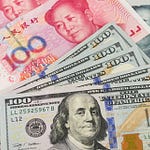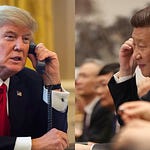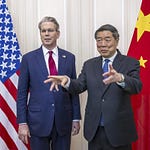Welcome to Episode 35 of Baiguan Radio. Today, Robert had another chat with Johnny of East8’s Newsletter again to talk about several important issues including:
[01:00] Anti-involution campaign: a new policy paradigm
[14:00] Childbirth subsidies
[19:25] The new mega project in Tibet
Curate Transcript: Key Viewpoints and Insights
The Anti-"Neijuan" (Anti-Involution) Campaign: A New Policy Paradigm
[00:01 - 00:03]
China is experiencing an unprecedented shift in economic policy with the emergence of "anti-neijuan" (anti-involution) as a major government focus. The term "neijuan," originally internet slang describing excessive competition that leads to squeezed margins and deflationary spirals, has now made its way into top-level policy documents and become a key governmental priority.
This campaign is visible across multiple industries. In the solar and steel sectors, authorities are actively addressing overcapacity issues. The food delivery market provides a particularly striking example: major e-commerce platforms like Alibaba and JD.com recently engaged in an intense subsidy war to compete with the dominant player Meituan. Just days before the podcast recording, these platforms issued what the hosts describe as almost a "truce," agreeing to pause their subsidy war. As Robert notes, "it's as if there's an invisible hand behind all of these, just pushing the spirit of anti-neijuan from all corners," which he calls "pretty unprecedented."
Central vs. Local Government Dynamics Drive the Problem
[00:04 - 00:06]
Johnny provides crucial context explaining that the over-competition problem stems from misaligned incentives between central and local governments. He points to President Xi's rare direct criticism, noting that "whenever local governments started to invest right now, it's always AI, electric vehicles, or data centers." This represents unusual transparency from top leadership about policy coordination failures.
The root cause lies in local officials' promotion incentives. Johnny explains that "in the past, different local governments, their officials trying to get promoted or considered the KPI to be related to these industries that are hot such as AI, EV, and et cetera. And so it's very natural for them to expand the capacity locally to develop these industries." Meanwhile, "the central government has very little oversight or industrial policymaking to actually persuade some of the provinces not to get into these industries."
Johnny emphasizes that individual companies aren't the villains here: "The companies are just doing what they could to compete in the market... these individual actors are acting very rationally. It's only because the government is not doing the right policymaking in the past, and now they're trying to make up for it."
Implementation Challenges: The Prisoner's Dilemma Problem
[00:07 - 00:10]
The transition from a production-focused to a balanced economic model faces significant structural challenges. Robert observes this represents a fundamental shift for China, coming "from an era of scarcity, so everything is scarce, so it's better just to produce more. But then there's danger in that."
Johnny identifies the core implementation challenge using game theory: local governments face a prisoner's dilemma where "if you are the only actor that cuts in this game and the other provinces continues to produce, then you are the one to lose." This creates a coordination problem requiring "a centrally coordinated effort trying to limit the amount of production for all the provinces in order to make this work."
The EV industry exemplifies these difficulties, with Johnny noting "the damage is already done. There's just been too many EV manufacturers in China, and the over-capacity issue is just gonna stay on for quite a while. Once the market competition started, you cannot turn it off." Different industries present varying levels of complexity - while food delivery involves only "three to four actors," making coordination more feasible, the EV sector is "much, much more complicated in terms of trying to slow down the production or limit the overall capacity."
Market Response and Investment Outlook
[00:11 - 00:14]
The anti-competition campaign has generated positive market sentiment, with capital markets experiencing what Robert describes as a "mini bull market" because "anti-neijuan, anti neijuan is great for capital holders." However, Johnny provides a measured perspective on market prospects.
While acknowledging that "the overall index has been up 30%" in Hong Kong markets this year, Johnny notes this comes "from a very low base." He expresses cautious optimism: "I wouldn't call it like it's gonna go down right now. I just also don't think so. I think it's gonna stay at the current level, maybe up a little bit, maybe down a little bit to the end of this year."
For sustained market growth, Johnny believes "you do need to have some more policymaking," pointing to recent birth subsidies as an example of the type of demand-stimulating policies needed.
Birth Subsidies: A Demand-Side Policy Shift
[00:14 - 00:19]
The government has introduced a new birth subsidy program providing 3,600 RMB annually per child, which Johnny considers "quite significant" because it represents "a blanket subsidy" rather than previous policies that only covered second or third children. This universal coverage means "a lot of families getting subsidized" including those who "just have one kid and initially they're not getting covered in this scheme."
While the amount may seem modest - Robert notes that "for people in the bigger cities, it actually doesn't mean anything, but maybe in the smaller places it actually means a lot" - Johnny sees it as "just a start" with potential for local government competition to enhance benefits. He anticipates "some local measures taken out just to promote their individual localities further" and suggests "longer maternity leave or even paternity leave for families" as more impactful future measures.
The Tibet Hydropower Project: Technological and Geopolitical Significance
[00:19 - 00:26]
The announcement of a 1.2 trillion RMB hydropower project in southern Tibet represents both technological achievement and strategic positioning. The project, designed to produce three times the energy of the Three Gorges Dam and equivalent to "almost about 20% of the power production in China," will create a new state-owned enterprise specifically for its management.
Johnny explains the project serves dual purposes in "the race for productivity" including "data centers and AI" which are "heavily conditioned upon if you have enough electricity to power these," while also addressing "geopolitical reasons" in a region with "territorial dispute between China and India." By placing major economic projects there, China demonstrates it's "very determined to at least be involved in this matter."
Robert highlights the technological breakthrough this represents, explaining that unlike traditional dams, the project will involve "boring into the mountains" with "several gigantic tunnels" to create underground waterfalls for power generation. He notes that China only recently achieved technological independence in tunnel boring machines, which are expensive, single-use equipment that "have to be scrapped" after each project. This represents "one of the many technologies that China have obtained and perfected over the last few years, which make this kind of project possible."











